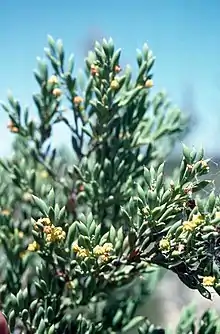Daviesia crassa
Daviesia crassa is a species of flowering plant in the family Fabaceae and is endemic to the south-west of Western Australia. It is a compact, dense, glabrous shrub with densely crowded, thick, club-shaped phyllodes, and uniformly yellow flowers.
| Daviesia crassa | |
|---|---|
 | |
| Near Harrismith | |
| Scientific classification | |
| Kingdom: | Plantae |
| Clade: | Tracheophytes |
| Clade: | Angiosperms |
| Clade: | Eudicots |
| Clade: | Rosids |
| Order: | Fabales |
| Family: | Fabaceae |
| Subfamily: | Faboideae |
| Genus: | Daviesia |
| Species: | D. crassa |
| Binomial name | |
| Daviesia crassa | |
Description
Daviesia crassa is a compact, dense, glabrous shrub that typically grows to a height of 1.8 m (5 ft 11 in) and has spreading to erect and often zig-zagging branchlets. Its leaves are reduced to crowded, thick, club-shaped phyllodes mostly 10–40 mm (0.39–1.57 in) long and 2–6 mm (0.079–0.236 in) wide. The flowers are mostly arranged in groups of three to five in leaf axils on a peduncle 3.5–6.0 mm (0.14–0.24 in) long, each flower on a pedicel 2–4 mm (0.079–0.157 in) long with egg-shaped bracts 0.5–1 mm (0.020–0.039 in) long at the base. The sepals are 4–5 mm (0.16–0.20 in) long and joined at the base, forming a bell-shaped base, the two upper lobes joined for most of their length and the lower three minute. The flowers are uniformly yellow, the standard broadly egg-shaped, 4.0–4.5 mm (0.16–0.18 in) long and 5.5–6 mm (0.22–0.24 in) wide, the wings spatula-shaped and about 4.5 mm (0.18 in) long and the keel about 4.5 mm (0.18 in) long. Flowering has been observed in January and the fruit is a flattened, triangular pod about 20 mm (0.79 in) long.[2][3]
Taxonomy and naming
Daviesia crassa was first formally described in 1995 by Michael Crisp in Australian Systematic Botany from specimens he collected near Harrismith in 1979.[3][4] The specific epithet (crassa) means "thick", referring to the phyllodes.[5]
Distribution and habitat
This species of pea grows in kwongan heath between Wagin and Harrismith in the Avon Wheatbelt biogeographic region of south-western Western Australia.[2][3]
Conservation status
Daviesia crassa is classified as "Priority Four" by the Government of Western Australia Department of Biodiversity, Conservation and Attractions,[2] meaning that is rare or near threatened.[6]
References
- "Daviesia crassa". Australian Plant Census. Retrieved 9 November 2021.
- "Daviesia crassa". FloraBase. Western Australian Government Department of Biodiversity, Conservation and Attractions.
- Crisp, Michael D.; Cayzer, Lindy; Chandler, Gregory T.; Cook, Lyn G. (2017). "A monograph of Daviesia (Mirbelieae, Faboideae, Fabaceae)". Phytotaxa. 300 (1): 279–281. doi:10.11646/phytotaxa.300.1.1.
- "Daviesia crassa". APNI. Retrieved 9 November 2021.
- Sharr, Francis Aubi; George, Alex (2019). Western Australian Plant Names and Their Meanings (3rd ed.). Kardinya, WA: Four Gables Press. p. 172. ISBN 9780958034180.
- "Conservation codes for Western Australian Flora and Fauna" (PDF). Government of Western Australia Department of Parks and Wildlife. Retrieved 9 November 2021.
